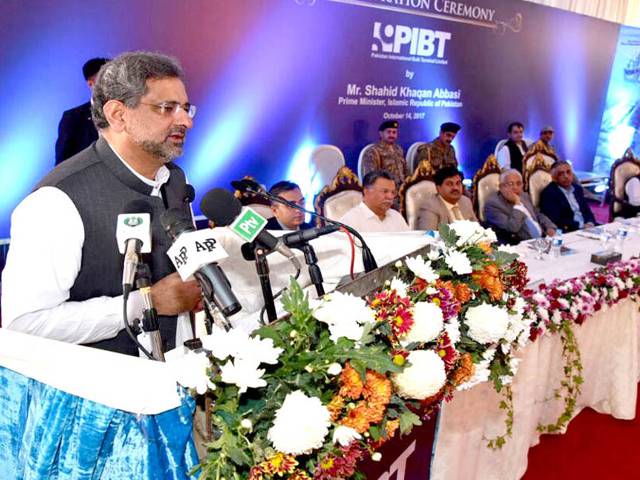KARACHI - Prime Minister Shahid Khaqan Abbasi Saturday said no progress was possible without democracy while dictators always failed to deliver while their rule damaged the country.
Addressing the inauguration ceremony of the country’s first coal, clinker and cement terminal at Port Qasim during his one-day visit to the metropolis, Premier Abbasi said whoever performed would be given a chance to rule again and those who didn’t deliver would be sent home.
The prime minister credited the people of Pakistan for their decision in favour of democratic system and noted the continuity of the system would also provide panacea to certain issues.
“Under a democratic system, people make their best choices and reject those who fail to deliver according to their expectations,” he said.
The prime minister further said the country was facing numerous crises, including the crippling power outages, when the PML-N government came to power in 2013. He added only a democratic government could overcome crises and face challenges.
Abbasi said the PML-N government had inherited a number of crises when it started its term in 2013, but the government had made electricity available by starting new projects to produce more than 10,000MW in the last four years. The government had also ensured gas supply to each consumer.
“After December this year, people will get whatever amount of gas they need and new connections will also be provided,” the premier said.
Abbasi asserted the country would not develop if there was no democracy, adding its flaws would be eliminated only if the democratic process continued to move forward.
He said a high-growth and low-inflation scenario existed in the country and vowed to counter all the challenges being faced by the economy.
Abbasi quoted some examples of development projects successfully completed during the present government’s tenure and said Lowari tunnel was unveiled by Zulfikar Ali Bhutto 45 years ago, but was finally completed by Nawaz Sharif with the cost of Rs 28 billion.
The premier noted the incumbent government had produced 10,000MW electricity in the four years and said this was the first regime in Pakistan’s history which had completed development projects on time.
He said gas scarcity was also adversely affecting the fertilizer industry, CNG stations and domestic consumers as well as other industrial units, so the government took vital steps to resolve this issue.
The prime minister said a huge network of highways and motorways was being arranged under the PML-N government. Under the China Pakistan Economic Corridor (CPEC), huge investment was made, which guaranteed prosperity, he added.
Prime Minister Abbasi noted that a heavy investment had been made in the Port Qasim terminal, which also happened to be eco-friendly. Pakistan had been in need of this terminal since long. He reiterated the terminal was environment-friendly and would be helpful for export of cement and clinker from Pakistan.
Sponsored by the Marine Group of Companies, Pakistan International Bulk Terminal (PIBT) handles coal, clinker and cement cargo at Port Qasim.
Built at a cost of $285 million, the PIBT began commercial operations in May. It can handle 12m tonnes of coal per annum.
Due to state-of-the-art mechanisation and full automation, the PIBT can handle coal, clinker and cement in two days as compared to seven days by a coal cargo ship at the Karachi Port.
The Pakistan International Bulk Terminal, under a 30-year built-operate-and-transfer agreement with Port Qasim Authority, has built its own jetty equipped with two coal ship unloading cranes and one cement/clinker loading crane.
The prime minister appreciated the role of Port Qasim Authority for extending support in completion of the LNG terminals.
Earlier, upon his arrival in Karachi for a daylong visit, the premier was received by Sindh Governor Muhammad Zubair and Chief Minister Murad Ali Shah.
ZAMIR SHEIKH






